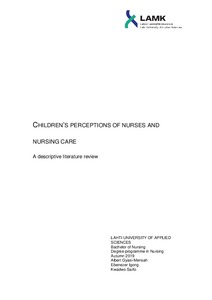Refreshing ergonomic skills for nurses working in nursing homes
Bett, Brian; Rono, Dominic (2025)
Bett, Brian
Rono, Dominic
2025
All rights reserved. This publication is copyrighted. You may download, display and print it for Your own personal use. Commercial use is prohibited.
Julkaisun pysyvä osoite on
https://urn.fi/URN:NBN:fi:amk-2025052214915
https://urn.fi/URN:NBN:fi:amk-2025052214915
Tiivistelmä
Musculoskeletal disorders (MSDs) among nurses in nursing care homes have become a pressing issue worldwide, leading to increased absenteeism, extended sick leaves, and lost workdays. These disorders are largely attributed to poor ergonomic practices and the physical demands of patient care, particularly in long-term care settings. Research indicates that nurses experience a higher prevalence of MSDs compared to other healthcare professionals, with studies reporting incidence rates ranging from 33.0% to 88.0% globally. Factors such as heavy workloads, prolonged shifts, and inadequate staffing exacerbate the risk of developing MSDs, ultimately affecting both nurses' well-being and the quality of care provided to elderly patients.
This thesis explores the significance of refreshing ergonomic skills among nurses working in nursing homes as a critical strategy to mitigate the risks associated with MSDs. It examines the ergonomic principles essential for safe patient handling, the environmental and occupational factors influencing adherence to these principles, and the common musculoskeletal injuries resulting from poor ergonomic practices. Furthermore, this study highlights the impact of compromised ergonomic skills on both nurses and patient outcomes, emphasizing the need for continuous education and reinforcement of ergonomic best practices. Addressing these challenges through training and workplace modifications is imperative to enhance nurses' health, reduce work-related injuries, and improve the overall standard of care in nursing homes.
This thesis explores the significance of refreshing ergonomic skills among nurses working in nursing homes as a critical strategy to mitigate the risks associated with MSDs. It examines the ergonomic principles essential for safe patient handling, the environmental and occupational factors influencing adherence to these principles, and the common musculoskeletal injuries resulting from poor ergonomic practices. Furthermore, this study highlights the impact of compromised ergonomic skills on both nurses and patient outcomes, emphasizing the need for continuous education and reinforcement of ergonomic best practices. Addressing these challenges through training and workplace modifications is imperative to enhance nurses' health, reduce work-related injuries, and improve the overall standard of care in nursing homes.
Kokoelmat
Samankaltainen aineisto
Näytetään aineisto, joilla on samankaltaisia nimekkeitä, tekijöitä tai asiasanoja.
-
Virtual Reality and its use in surgical nursing training : a literature review into the effectiveness of Virtual Reality as a new practical educational method for training Registered Nurses in surgical nursing
Jokinen, Felipe Ignacio (2021)The general purpose of this thesis was to review the literature available to Virtual Reality to ascertain if the technology has a possibility to augment or become a more effective way to train Registered Nurse students in ... -
Cultural Diversity in Finnish Health Care: A COMPARISON OF NURSE MANAGERS, NATIVE-FINNISH REGISTERED NURSES, AND IMMIGRANT REGISTERED NURSES PERSPECTIVES AND EXPERIENCES OF CULTURAL DIVERSITY IN THE FINNISH HEALTHCARE WORK ENVIRONMENT
Atanga, Josephine; Mwangi, Caroline; Ghimire, Dibya (2022)Background: There is a global scarcity of healthcare workers, particularly in Western countries such as Finland resulting in a greater reliance on foreign-trained professionals to fill the gap in the nursing workforce. ...Rajoitettu käyttöoikeus / Restricted access / Tillgången begränsad -
Children's perceptions of nurses and nursing care : A descriptive literature review
Gyasi-Mensah, Albert; Sarfo, Kwadwo; Igong, Ebenezer (2019)Hospitalization can be a very stressful and traumatic experience for children. Children have a limited understanding of procedures and hospital environment. Thus, it is even more important for health care professionals to ...

